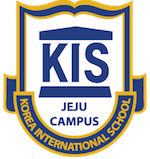This article contains promotional content .(April 2023) |
| Korea International School, Jeju Campus KISJ | |
|---|---|
 | |
| Location | |
 | |
8 Global Edu-ro 260beon-gil, Daejeong-eup , South Korea | |
| Coordinates | 33°17′22″N126°17′1″E / 33.28944°N 126.28361°E |
| Information | |
| Type | College-prep, International Day and Boarding |
| Motto | Responsible Leaders for Positive Change |
| Established | 19th September 2011 |
| Founder | YBM |
| Category | International School |
| CEEB code | 682003 |
| Chairperson | Sunshik Min, PhD |
| Head of school | Patrick Carroll |
| Faculty | 153 |
| Grades | JK–12 |
| Gender | Coeducational |
| Enrollment | 1260 |
| Average class size | 15–19 |
| Student to teacher ratio | 7:1 |
| Colors | Blue and gold |
| Mascot | Dragon |
| Accreditation | WASC |
| Website | www |
Korea International School, Jeju Campus (KISJ) is South Korea's first international boarding school. [1] [2] The school is a sister campus to Korea International School [3] [4] and an affiliate of YBM, a publishing and English-language education services company. [5] Founded in 2010 and first opened in 2011 as part of the Jeju Global Education City, [6] the school's first senior class of 52 students matriculated in May 2016. [7] KISJ is a proprietary, nonsectarian school offering an internationalized American college preparatory curriculum from Junior Kindergarten through Grade 12, with a boarding program starting in Grade 6. The high school began its AP Capstone™ in 2017–18, one of seven schools to offer it in South Korea.
Contents
- Academics
- Elementary school
- Middle school
- High school
- Co-curricular Activities
- Athletics
- TEDx
- Arts
- Clubs and Other Activities
- Facilities
- Students
- Faculty
- Boarding
- References
- External links
Korea International School, Jeju Campus is one of few international schools in South Korea where students can enroll without holding a foreign passport or having studied abroad for more than 3 years. The school received a six-year full accreditation from the Western Association of Schools and Colleges (WASC) [8] in August 2015, and is also accredited by the South Korean Ministry of Education; Korean nationals graduate with both a U.S. and South Korean high school diploma.
10 Magazine ranked Korea International School's three campuses collectively as the second best international school in Korea in August 2017. [9]
Korea International School, Jeju Campus is a member of the Korea Council of Overseas Schools (KORCOS) [10] and the East Asia Regional Council of Schools (EARCOS). [11] Additionally, the school maintains associations with a number of international organizations (Thinking Collaborative™, St. Mark's School, the Massachusetts Institute of Technology, World Youth Adventures); participates in national KISAC, KIAC, KIMEA and JAC athletic conferences, as well as international Model United Nations and robotics conferences; collaborates with other international schools in providing professional learning opportunities in addition to hosting weekend workshops for its faculty and outside educators. In winter 2023, KISJ collaborated with two neighbor international schools to host its first GEC Just Learning Conference since before the COVID pandemic.
